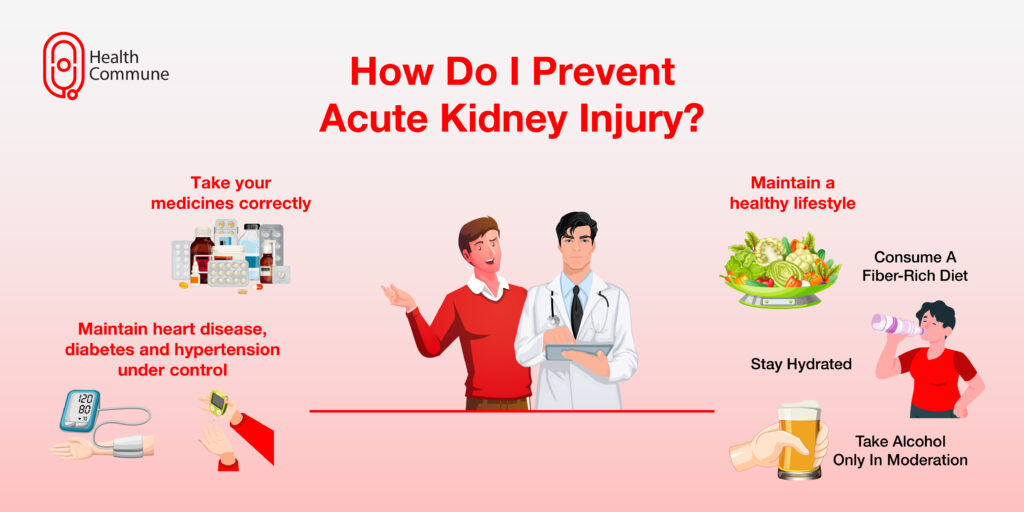What is acute kidney injury (AKI)?
How does acute kidney injury occur?
Based on the cause, it can be either prerenal, renal or post-renal.
Prerenal: Reduced blood supply to the kidneys due to various factors such as:
- Heart failure
- Liver failure
- Septic shock
- Internal bleeding
- Severe vomiting or – diarrhoea
- Pancreatitis
- Diabetic ketoacidosis
- Renal artery obstruction
- Drugs such as ACE inhibitors (they are useful in bringing down your blood pressure), NSAIDs (a group of painkillers), cyclosporine (an immunosuppressant medication)
Renal: Direct damage to the kidneys, including:
- Acute tubular necrosis (decreased blood flow to the kidney causing death of tissue)
- Severe widespread infection or sepsis involving the entire body
- Kidney diseases, such as glomerulonephritis
- Malignant hypertension
- Drugs such as antibiotics (cephalosporins, sulfonamides, aminoglycosides), NSAIDs (a group of painkillers), anti-tubercular drugs (rifampin), heavy metals
- Malaria
- Crush injuries
Postrenal: Obstruction to urine flow after leaving the kidneys, caused by conditions like:
- Enlarged prostate
- Kidney stones
- Cancer of the cervix, prostate etc.
- Urethral stenosis
- Neurogenic bladder

Who’s at risk for developing acute kidney injury?
The following group of people at an increased risk of developing this condition:
- Elderly patients
- Those hospitalised for a long period of time in the ICU
- Diabetics
- Hypertensive patients (those with high blood pressure)
- Those suffering from heart failure
- People with kidney or liver disease
What are the symptoms of acute kidney injury?
People present with symptoms of uremia, or elevated levels of urea in the blood. These include:
- Decrease in urine output
- Fluid retention leading to swelling of feet, legs, arms etc.
- Loss of appetite
- Nausea and vomiting
- Mental confusion
- Drowsiness
- Seizures or fits
- Coma
- Rash and itching
- sensation
- Breathlessness, in case of fluid overload
- Nosebleeds
- Blood in stools or vomit
What are the complications of acute kidney injury?
Some serious life-threatening complications include:
- Metabolic disturbances such as increased blood potassium, magnesium, phosphate and uric acid levels, or decreased calcium levels
- Cardiac arrhythmias
- Fluid build-up in the lungs and heart
- Internal bleeding from the GI tract
- Anaemia
- Neurological disturbances
- Infections, such as urinary tract infections (UTIs), pneumonia or septicemia
How is acute kidney injury diagnosed?
Your doctor takes a comprehensive medical history and asks you to do the following tests to confirm the diagnosis:
- Blood test to check the functioning of the kidney. Blood urea and creatinine levels are usually raised
- Additional blood tests to check for blood potassium, calcium, phosphate and magnesium levels in case of electrolyte disturbances
- Urinalysis: Depending on the cause, findings can include the presence of proteins, glucose, red blood cells, white blood cells and casts in the urine
- Chest X-ray in case of accumulation of fluid in the lungs or pericardium
- ECG (Electrocardiogram) for any kind of arrhythmias
- Additional tests, such as a renal biopsy in case of autoimmune disease or CT scan or MRI scan to detect tumours or obstruction in the urinary tract
How is acute kidney injury treated?
In most instances, restricting fluid intake and restoring electrolyte balance is sufficient. Some measures include:
- Limiting your fluids to around 400 ml per day (Fluid restriction depends on the level of fluid retention in the body and how much is lost by the body through the skin, urine etc.)
- Restoring electrolyte balance, especially potassium and sodium
- Restoring the acid-base balance and normalising the pH of the blood
- Restricting your protein and salt intake
- Vitamin supplements
- Preventing the developments of complications, such as infections or bleeding from the GI tract by administering antibiotics, proton pump inhibitors or gastroprotective agents
- Identifying and treating the underlying cause
- Dialysis may be warranted in very severe cases
How can I prevent acute kidney injury?
You can reduce your risk by:
- Keeping your disease (eg. if you’re a heart patient or suffering from diabetes, hypertension etc.) under control to avoid complications
- Strictly taking all your medications (eg. painkillers, antibiotics etc.) as per your doctor’s instructions to prevent any kind of damage to your kidneys, especially if you are suffering from any other pre-existing conditions
- Maintaining a healthy lifestyle by:
- Staying hydrated by drinking plenty of fluids
- Consuming a fibre-rich diet with lots of fresh fruits and vegetables, wholewheat grains such as brown rice, oats, ragi, millets etc.
- Taking alcohol in moderation



